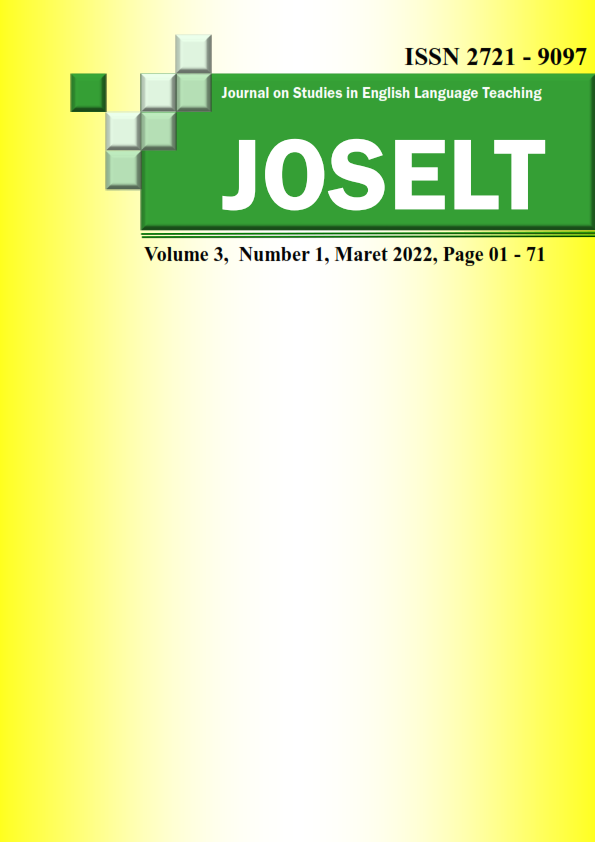EXPLORING EFL LEARNERS’ READING COMPREHENSION THROUGH PQRST
Keywords:
reading comprehension, PQRST, recount text, learning achievementAbstract
This study examines how reading comprehension can be enhanced through an intervention of PQRST. This study used a classroom action research design by monitoring and controlling the teaching-learning process. The subjects of the study were 30 eighth-grade students of SMP Negeri 3 Tampaksiring. The data were collected through tests and questionnaires after the instruction of PQRST in 2 cycles. The study revealed that the student’s comprehension of the contents of English text gradually increased as can be seen from the comparison of the pre-test which was 52.33 categorized as “insufficient” and the mean score post-test 1 was 79.56 categorized as “good”, and the mean score of post-test II was 88.36 categorized as “excellent” achievement. The result of the post-test in each cycle clearly showed that there was significant improvement concerning the subjects’ ability in reading comprehension. Besides, the subjects also gave positive responses to the implementation of PQRST technique in teaching reading comprehension. Therefore, through this technique, the EFL teachers can allocate the students’ difficulties, stimulate students’ knowledge, and provoke students’ positive learning behavior.
References
Ary, D. et al. (2010). Introduction to Research in Education: 8th Edition. USA: Wadsworth Cengage Learning.
Anderson, M. (2003). Types Text in English (Third Edition). Australia: Mcmillan.
Anak Agung Aryshanty Rahayu (2017). Improving Reading Comprehension through PQRST of The Eight Grade Students of SMP Dharma Wiweka Denpasar in Academic Year 2016/2017
Brown, H. D. (2004). Language Assessment: Principles and Classroom Practice. San Fransisco, California:Longman.
Brown, H. D. (2004). Language Assessment: Principles and Classroom Practices.
Caldwell, J. S. (2008). Reading Assessment A Primmer for Teachers and Coaches. Second Edition. New York : The Guilford Press.
Champion, A, J. (2006) Neuropsichological Rehabilitation, A. Recognitive for Group-Based Education Intervention. England: John Wiley & Sons, Ltd.
Eliszabeth Buchter Bernhardt. (2011). Understanding Advanced Second Language Reading. Routledge.
Elliot, J. (2001). Classroom Action Research Abstracts. Madison Metropolitan School District.
Frank Smith. Understanding Reading: A Psycholinguistics Analysis of Reading and Learning to Read. Routledge.
Haris and Graham (2007) Teaching Reading Comprehension to Students with Learning Difficulties.
Ketut, W. I., & Putu, S. A. (2021). Promoting English Learning For Adult Starters: A Gap Between Emotion And Teaching Strategy. Journal on Studies in English Language Teaching (JOSELT), 2(1), 50-63.
Ketut, W. I., & Nengah, A. I. (2021). Implication CBI Towards Adult Learners’business English Correspondence SKILLS. Journal on Studies in English Language Teaching (JOSELT), 2(2), 50-65.
Klinger, J. K, Vaugh, S,. and Boardman, A (2007). Teaching Reading Comprehension to Students with Learning Difficulties. New York: The Guildford Press.
Klingner, Janette K., Vaughn, Sharon, and Boardman, Alison. (2007). Teaching Reading Comprehension to Students with Learning Difficulties. New York: The Guildford Press.
N’Namdi, K. A (2005). Guide to Teaching Reading at the Primary School Level. Paris: The United Nations Educational, Scientific and Cultural Organization.
Nunan, D. (2003). Practical English Language Teaching. New York: MC Graw- Hill.
Turkington, Carol. (2003). Memory a self-teaching guide. Canada: John Wiley & Sons, Inc.
Wardana, I. K., Astuti, P. S., & Sukanadi, N. L. (2020). Sikap Belajar dan Kemahiran Bahasa Inggris Karyawan Mexicola Melalui Pelatihan Berbasis Pelibatan Terintegrasi. Jurnal Bakti Saraswati (JBS): Media Publikasi Penelitian dan Penerapan Ipteks, 9(1).
Wardana, I. K., Dharmayanti, P. A. P., & Arsana, A. A. P. (2022). ELT lecturers’ communicative language teaching approach in directing students’ emotions in distance learning. Studies in English Language and Education, 9(3), 1071-1092.

